Blockchain
Hicky.io Answers Why a Dating App Need to Use Blockchain Technology


The internet has become a cozy place to a third of the world’s 7 billion population and it is growing rapidly. The internet is the key to a new world, full of exciting opportunities, including the ability to be anywhere with anyone – as well as to be anyone. The internet’s anonymity feature is both its greatest strength and its weakness. On the one hand, it gives individuals the unique opportunity to start from scratch, regardless of their past or present, and express themselves without fear of persecution. On the other hand, individuals can exploit this ability to perpetuate their criminal or malicious activities. And when it comes to establishing a long-lasting relationship, anonymity is the last thing anybody wants.
The internet is full of cautionary tales about the dangers of meeting strangers; some disappointing and others shocking. Naturally, these stories and experiences have deterred people from forming deep and meaningful relationships, preferring superficial and perfunctory exchanges for the sake of their own safety.
But what if there was a way to remodel relationships on the web? What if there was a way to bring back honesty and transparency into the online dating domain? What if there was a place where you could confidently form long-lasting and intimate relationships without worrying about the motives of the person at the other end of the screen?
Blockchain technology is the answer.
Immutable. Secure. Tamper-proof.
Blockchain technology is a decentralized and distributed, public ledger system for the peer-to-peer exchange of values and information.
Distributed over hundreds of thousands of computers, blockchain technology is a tamper-proof, immutable, and self-sovereign technology that has been heralded as the most disruptive technology ever known to mankind. Information written into the blockchain cannot be changed or modified and since the record is distributed across geographically dispersed devices, no single entity can own or control it.
Blockchain technology enables users to directly share and exchange values without any third-party interference or invasion of privacy.
A Game Changer
Online dating is a double-edged sword for most. You’re either paying exorbitant subscription fees for premium features such as ad removal or profile promotion (getting a higher chance of matching with relevant users)-, or you’re getting bombarded with ads and with limited access to the network. While ads, for instance, seem to be a small price to pay, recent research has shown that these users often wind up paying a steeper price that includes privacy invasion and wholesale trafficking of users’ data in order to maximize profits.
It shouldn’t be that way. And it does not have to.
Information is power and personal information is leverage.
Online dating is solely based on the exchange of information. Credible and honest information generates trust and increases one’s chance of being successfully matched with the right person – one’s soulmate. However, sharing this information exposes the user to risk; the more detailed the profile, the greater the risk.
As we have seen at a large scale in the Ashley Madison Hack, providing secure and tamper-proof data storage facilities is of the utmost importance for any service provider to guard the user against such breaches and protect users’ privacy. The blockchain’s cryptographically secured storage and exchange protocols have the potential to solve the problems plaguing the dating industry.
But how?
Hicky.io is the answer the industry has been waiting for.
A Secure and Confidential Platform
Hicky.io is a blockchain powered dating platform that leverages crowd wisdom, decentralized and encrypted data storage as well as an underlying token economy to create the best and most secure dating platform.
Using smart contracts and a token-based incentivization system Hicky.io uses a combination of visual and auditory verification protocols to prove identity and establish secure and direct, peer-to-peer channels of exchange.
Hicky’s groundbreaking platform is a first for the multi-billion online dating industry. Its innovative features are set to change not only the dating scene but how long-lasting relationships are going to be established. Knowing that the person on the other end of the screen is as real as their profile claims to be breaths an air of confidence into every interaction. And knowing that your privacy can never be intruded is just what the dating scene needs!
Read more about Hicky on their website and join their Telegram channel to stay in touch.
Blockchain
dVIN Labs Launches dVIN Protocol from Stealth to Tokenize the $1T Wine Asset Class

dVIN Labs, the development team behind the dVIN protocol, today announced the launch of the dVIN Protocol (“dVIN” or the Protocol) from stealth. The dVIN protocol is built on Solana and is designed to leverage a combination of data, DePIN and tokenization to bring wine, a $1T real world asset class, on-chain.
David Garrett, Co-Founder & CEO of dVIN Labs, commented on the news, “We’re thrilled to announce the launch of dVIN Labs’s first protocol, dVIN, from stealth. By transforming each bottle into a unique digital asset, the tokenization of luxury wine enhances the social and economic dimensions of wine collecting and investing.”
The launch of dVIN is marked by the introduction of the Cellar Challenge, an initiative that enables participants to earn points by tokenizing bottles from their home cellar, and then opening those bottles and sharing each bottle with up to 12 friends to earn Tasting Tokens. Exclusive to dVIN, Tasting Token™ NFTs (“Tasting Tokens”) are functional NFTs connected to a Digital Cork™ NFT (“Digital Cork”). When a bottle is tokenized, it’s linked to a Digital Cork NFT on the blockchain. Tasting Tokens are minted when these bottles are opened and the Digital Cork is destroyed.
Collecting Tasting Tokens grants access to exclusive experiences and special rewards from winemakers. Over time, these NFTs serve as an immersive virtual tasting journal, allowing winemakers to engage directly with consumers at the moment of enjoyment and offer tailored incentives. The Cellar Challenge will not only generate valuable data but also facilitate the rapid acquisition of new users. Additionally by unlocking “Beast Mode,” luxury wine enthusiasts can rack up additional points in the challenge by competing to conquer one of the five leaderboards.
Club dVIN (or “the Club”), is the world’s premier global wine club providing members access to unparalleled wine experiences and exclusive benefits. The Club’s ~1,000 early adopters along with several of dVIN’s partner communities – including RealVision, CryptoMondays, Friends with Benefits, Madlads among others – will have the ability to join the Cellar Challenge early. For instance, RealVision ProCrypto members will receive special access and points, with every member getting at least 12,000 points if they join the challenge, and can earn up to 48,000 points if they complete all the quests!
Points accumulated in the Cellar Challenge will translate to a $VIN airdrop at the time of the token launch in Q3 2024 and others to be announced. For more information on the mechanics of the $VIN Token, see the $VIN Whitepaper.
Garrett concluded, “The Cellar Challenge will help wine enthusiasts engage with their collections and share their experiences, serving as both a sandbox and proof of concept, to showcase the capabilities of dVIN.”
dVIN Labs also recently partnered with SegMint GmbH (“SegMint”), a digital assets management platform, to fractionalize 12 bottles (0.75L) of Weingut Egon Müller 2022 Riesling Scharzhofberger Auslese, making them for sale via the platform here. Egon Müller is the only German producer to belong to the world’s most exclusive alliance of the 12 best family-owned wineries, Primum Familiae Vini, and its wines are some of the most coveted and collectible in the world, but also among the most costly ounce for ounce.
Which makes these bottles ideal first candidates for the first set of luxury wines offered as a more reasonable fractionalized investment via the SegMint platform. This is the first of many luxury wine listings that dVIN Labs plans to organize with luxury wine listings planned for RWA marketplaces like Jupiter’s Giant Unified Marketplace (“GUM”) and others to be announced.
About dVIN Labs
dVIN Labs is the development team behind the dVIN protocol which is designed to leverage a combination of data, DePIN and tokenization to bring wine, a $1T real world asset class, on-chain. The dVIN Protocol leverages blockchain technology to both allow wine enthusiasts to monetize their data and be rewarded for their wine activity, purchases, and loyalty. While winemakers simultaneously incentivize these wine lovers to share consumption data and personal data in order to drive deeper consumer relationships, making their businesses more responsive, efficient and profitable. To learn more about dVIN Labs and the dVIN Protocol, please visit: https://dvinlabs.com
Blockchain
Folks Finance launches xChain testnet on Base, Avalanche, and Ethereum

Folks Finance, the largest DeFi app on Algorand, has launched the testnet for its next-generation xChain lending app. The testnet will be deployed on four major blockchain networks: Base, Avalanche, Arbitrum, and Ethereum.
The primary goal of the Folks testnet is to thoroughly assess and validate Folks’ crosschain framework, which aims to provide an intuitive, efficient, and flexible lending experience across multiple networks. Built using Chainlink CCIP, Wormhole, and Circle CCTP, Folks seeks to address the needs of a large cohort of DeFi users eager for crosschain innovation.
Try Folks’ testnet today, and get recognition within the Folks community with the Subway Riders Folks Campaign on Galxe. Check out the testnet guide for more information.
Regarding the mainnet release, Folks Finance has targeted the beginning of Autumn 2024. The testnet will allow the team to refine the protocol’s features and address any hiccups before the full-scale launch. Nonetheless, the team intends to move with purpose toward releasing a mainnet product in good time.
Folks’ team has been preparing for the crosschain expansion for over a year to ensure a smooth launch. The preparation includes security audits by Ottersec as well as a public community bug bounty on Immunefi worth $100,000.
The selection of Base, Avalanche, and Ethereum as the genesis networks was a key decision, and below are the reasons why those networks were chosen for day-1.
- Base, an Ethereum layer-2 built on the Optimism stack, offers high scalability and low transaction fees, making it an attractive option. Additionally, the ecosystem of Base is still in its early days, and Folks could provide invaluable lending infrastructure to accelerate the growth of the network and its DeFi scene.
- Avalanche, a high-performance blockchain, acts as the engine of Folks’ crosschain system. Its well-rounded strengths were a perfect match for the consistency Folks needs to power a comprehensive DeFi suite. With fast transaction finality, low fees, strong decentralization, and compatibility with the Ethereum Virtual Machine (EVM), Avalanche fit the bill for a day-1 network.
- Finally, Ethereum, the foundational blockchain for DeFi, serves as a crucial component, ensuring an onramp for the largest DeFi ecosystem. Dominating industry-wide TVL, Ethereum was a requirement for day-1 integration.
By launching the xChain expansion on these four networks, Folks is moving the industry toward solving the fragmentation problem in DeFi. The team’s aims to be the solution, bringing community and capital together by acting as a connective structure between isolated networks.
About Folks Finance
Folks Finance is a pioneering DeFi platform that offers a comprehensive suite of decentralized financial services, including cross-chain lending, borrowing, and trading. With a focus on security, efficiency, and user empowerment, Folks Finance is dedicated to reshaping the financial landscape by leveraging blockchain technology.
Blockchain
StakeVault.Network to Launch Validator Services for ETH, ATOM, TIA, and SUI
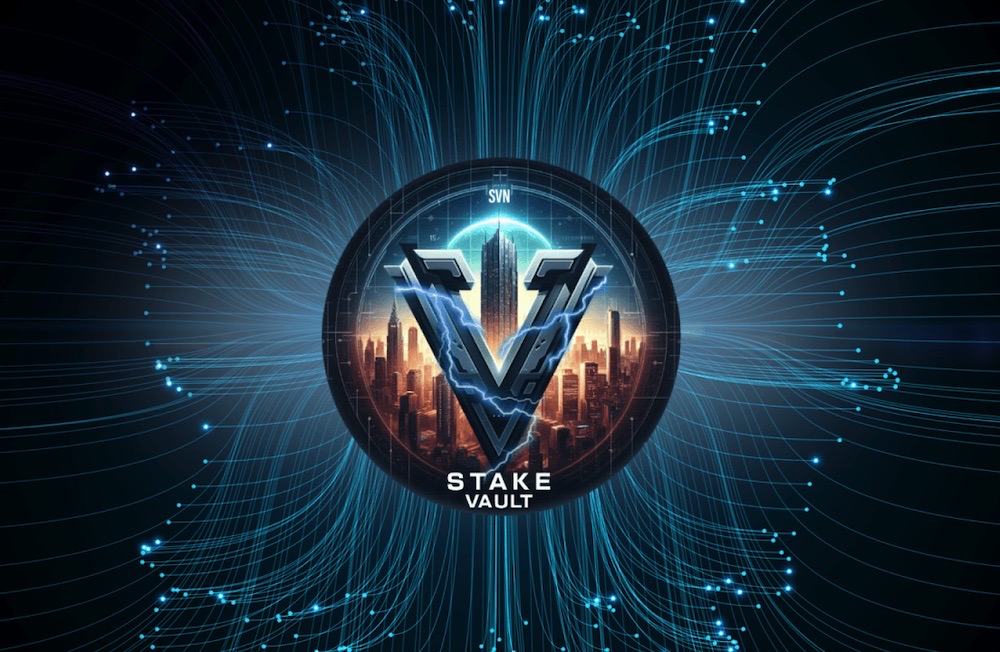
StakeVault.Network (SVN) is set to expand its validator services to major blockchain networks, including Ethereum (ETH), Cosmos (ATOM), TIA, and SUI, in the near future. This expansion aims to provide users with secure and efficient staking services, enhancing the security and performance of each network.
Discover StakeVault.Network
StakeVault.Network is a project dedicated to offering cutting-edge blockchain infrastructure. It provides validator services that support the operation and security of networks through user-held crypto assets. In today’s rapidly evolving blockchain technology landscape, there is a pressing need for secure, efficient, and scalable solutions for staking and node validation. These processes are crucial for strengthening network security, achieving consensus, and promoting decentralized governance across blockchain ecosystems.
Despite significant advancements, existing node validation and staking solutions often face scalability limitations, insufficient security measures, and a lack of user-friendly interfaces, hindering widespread adoption. StakeVault.Network aims to redefine the staking environment by introducing a robust, scalable, and secure platform to address these challenges, positioning itself as a game-changer in the industry.
Revolutionary Validator Solutions
StakeVault.Network offers comprehensive and customized solutions to address the challenges of staking and node validation. The platform implements advanced node authentication mechanisms to ensure that only reliable nodes participate, enhancing security through multi-factor authentication and continuous monitoring. Its efficient staking mechanism minimizes energy consumption while maximizing network security and participation, and a dynamic reward distribution model ensures fair and transparent rewards.
The user-centric design provides an intuitive interface and simplified staking process, encouraging broad participation. By promoting reliability and empowerment through a transparent economic model and community governance, StakeVault.Network supports the healthy development of the platform.
Expanding Horizons (ETH, ATOM, TIA, SUI)
SVN will provide validator services on the following major blockchain networks:
Ethereum (ETH): Founded by Vitalik Buterin in 2015, Ethereum is a decentralized platform with smart contract functionality. It serves as the foundation for decentralized finance (DeFi) and non-fungible tokens (NFTs), and many decentralized applications (DApps) have been developed on it.
Cosmos (ATOM): Cosmos aims to provide interoperability between blockchains with its native token, ATOM. It envisions an “Internet of Blockchains” and offers a software development kit (SDK) for creating independent blockchains.
TIA (Celestia): Celestia offers a modular blockchain focused on specific functionalities, addressing the trilemma of decentralization, scalability, and security. It uses Data Availability Sampling (DAS) for efficient block verification.
SUI: SUI is a layer 1 blockchain network designed for fast and low-cost transactions. It adopts the unique programming language “Sui Move.” SUI has expanded its ecosystem through partnerships with major companies.
Power of SVN Token
The SVN token is a crucial component of the StakeVault.Network ecosystem. Token holders can participate in decision-making processes and earn staking rewards in SVN tokens. Additionally, SVN tokens are used to pay for services and transaction fees, supporting the economic activities within the ecosystem.
About Us
Website: https://stakevaultnet.com/
Twitter: https://x.com/StakeVaultNet
Telegram: https://t.me/StakeVaultNetwork
Blockchain
Introducing Three Protocol: Building An Alternative To Centralized Digital ID’s and KYC with No-KYC Zero Knowledge Proof, Decentralized Digital ID’s

Three Protocol, a new project is building an alternative to centralized digital ID’s and KYC with no-KYC zero-knowledge proof, decentralized, digital ID’s (ZKi3s) in online marketplaces, announced its main features rivaling those of industry-established brands, such as Polygon ZKP, Starknet, zkSync, and DOP. The project aims to help users engage in secure, private digital interactions within a fully decentralized, trustless environment.
Zero-knowledge proof (ZKP) IDs are increasingly in demand in the emerging Web3 economy. Blockchain-based systems can ensure better performance and security in this landscape than the traditional Web 2.0 has to offer. Their focus on scalability, decentralization, and privacy offers a bridge for Web 2.0 online marketplaces toward Web3. Meanwhile, the latter’s reliance on national identification and KYC requirements affects user safety and privacy. Moreover, imposing verification excludes many from participating in online economic activities, especially those who are unbanked or lack proper identification.
Three Protocol eliminates KYC (Know-Your-Customer) or national identification requirements for marketplace access, allowing the unbanked and debanked communities to engage in online commerce. Signing up requires only a crypto wallet and the implementation of Zero-Knowledge Proof Psudoanonymised digital IDs. Therefore, a user’s profile on the blockchain is only a SHA256-hashed immutable entry on blockchain technology.
ZKi3s are no-KYC, zero-knowledge proof blockchain entries showing the owner’s online relationship history reputation, which forms the basis on which all Three Protocol systems function. Individuals can mint their own ZKi3s without providing national ID, biometric details, or passing KYC verification.
A ZKi3 is used to send ZK-Stark proofs between a review issuing protocol (e.g., an online marketplace) and an issuing protocol. This can occur whenever a user desires to collect a review or reputation score for any digital relationship or transaction. The ZKi3 is never visible publicly on the blockchain, ensuring the user’s transactions remain private.
Three Protocol confirmed that the algorithmic formulae for ZKi3s will be made open source. Therefore, any digital platform or online marketplace can integrate ZKi3s via a permissionless process.
Three Protocol also uses a Neural Network AI model employing cutting-edge alphanumeric AI algorithms to build a real-time updated product, a service, and a real-world assets interface for users. Furthermore, Three Protocol introduces the concept of DAIOs (Decentralized Artificial Intelligence Organizations) to implement open-source updatable AI systems and ensure users make informed decisions when voting.
ZKP ID providers take different approaches to the main aspects that define a ZKP ID system’s performance. These aspects include government access, privacy, KYC requirements, open-source nature, use of ZK-STARKs, and trustlessness. Here is how Three Protocol regards these manners and how it ranks against other leading projects, including Polygon ZKP, Starknet, zkSync, and Data Ownership Protocol (DOP).
Government Access
Three Protocol prioritizes the user’s control over their data and activities. Its decentralized ZKP digital ID technology maintains such sensitive information inaccessible to third parties. Besides Three Protocol, only a handful of other ZKP providers have this approach. On the other hand, projects like Polygon ZKP, zkSync, and DOP prioritize regulatory compliance over user autonomy and self-sovereignty.
Privacy
Three Protocol employs cutting-edge ZK-Stark technologies to guarantee the user’s identity remains anonymous. This feature sets this project apart from other similar initiatives. For example, Polygon ZKP considers its system’s scalability more important than keeping the user’s ID secret. Meanwhile, zkSync utilizes ZK-Rollups to prevent third-party access to user information but still requires KYC from its users. Lastly, DOP adopts a selective transparency and regulatory compliance policy and disregards user confidentiality.
KYC Requirements
One of the most appealing aspects of ZKP identification is that it often doesn’t require KYC verification. Three Protocol ensures its users enjoy this benefit and keep their sensitive information secret. Apart from Three Protocol and DOP, only a few other projects follow the same practice. At the other end of the spectrum, projects like Polygon ZKP, Starknet, and zkSync require users to pass Know-Your-Customer procedures, affecting user inclusivity and privacy.
Open Source Code
Three Protocol is among the industry’s top ZKP DID providers, along with Polygon ZKP, Starknet, and zkSync, maintaining an open source code. This feature allows the project’s growing community to contribute and scrutinize its development, thus enhancing its trustworthiness.
ZK-STARKs (Zero Knowledge Scalable Transparent Argument of Knowledge)
Three Protocol utilizes ZK-STARKs to provide security against privacy threats and enhance performance levels without affecting decentralization. Only a few other projects follow this practice, e.g., Starknet. However, more prominent brands, like Polygon ZKP, zkSync, and DOP, do not consider ZK-STARKs a priority.
Trustless
Three Protocol uses tri-signature smart contracts and DAO governance to ensure a fully decentralized and trustless experience. Moreover, it provides unbiased dispute resolution and self-custody, setting an industry standard with this approach, which only a few other brands, such as Starknet and zkSync, also follow.
About Three Protocol
Three Protocol is Tectum Labs’s first incubated project. Its mission is to modify the current paradigms of online marketplaces through decentralization and create financial inclusivity for individuals without access to traditional banking services.
The project uses the Three Protocol Neural Network AI model to create marketplaces that increase the efficiency and accuracy of searching for products, services, real-world assets, and clients based on personalized user queries.
Three Protocol integrates cryptocurrency utility to broaden the purchasing power and utility of cryptocurrency holders. Its implementation of an AI-driven DAO should also help increase equity and fairness in the user-online marketplace relationship.
Lastly, Three Protocol uses a unique blend of privacy, self-custody, and decentralized governance that sets it apart from other ZKP ID providers. Its services cater to users and developers who value anonymity, trustlessness, and decentralization.
Blockchain
Data Ownership Protocol – Itheum – Launches on Solana, Embracing AI and Gaming

Itheum, a data ownership protocol, has unveiled ItheumV2, emphasizing AI and gaming data, and is now expanding on the Solana blockchain. This expansion began with the release of Data NFTs on Solana, allowing users to participate in the Get BiTz meme-burning game to collect BiTz XP, which contributes to Proof of Activity within the ecosystem. This activity is later converted to Liveliness Scores, backed by $ITHEUM tokens, meaning that each user will get $ITHEUM tokens proving their Liveliness Score. The inaugural GetBiTz version on Solana was launched via DRiP, and of course, more opportunities for participation will be dropped via the same channel in the future, all you need to do is to subscribe/follow and make sure you’re securing a BiTz Data NFT drop when the time comes.
Following the successful deployment on Solana, Itheum secured the 5th position at the Solana Summit, marking a huge milestone for the development of the protocol on the Solana Network. The next step is to onboard gamers to the Gamer Passport when it launches and for this, we invite you to read more and stay up to date with the Itheum developments to make sure you’ll be able to join the Gamer Passport Alpha Stages.
Omni Chain Expansion Debuts with the Launch of the Itheum on Solana
A significant milestone in Itheum’s expansion is the launch of the Omni Chain Token Bridge between Solana and MultiversX blockchains, now live on mainnet. This has been done after a series of QA tests and security audits by xAudits with a full public report available on their official website. The $ITHEUM token is accessible on both blockchains, with strong liquidity pools on platforms like xExchange and Raydium as the primary DEXs (more coming soon), offering community access to the native token through various ways.
Initially launched on the MultiversX blockchain, Itheum introduced Data NFT technology aimed at onboarding diverse content creators—musicians, writers, educators, podcasters, game developers, on-chain analysts and more. This technology enables creators to bridge their work into the web3 space, offering a way to create fractionalized ownership over their work.
Fans can support creators by owning pieces of those collections and enjoying the content which is unlocked directly inside the NFT. Itheum also developed the Itheum Explorer platform, a tool that allows anyone to visualize the Data NFT in a human-readable form. This platform features a music player, arcade game zone, and educational widgets and more, allowing creators to share their work as Data NFTs. As an infrastructure layer on MultiversX, various protocols have built applications on top of Itheum, including a Loyalty Aggregator App for trading cashback as Data NFTs, a Social Media app for minting interactions as Data NFTs, and Data Aggregators.
ItheumV2 Empowers Gamers to Earn with Data NFTs in New AI-Driven Narrative
ItheumV2 introduces a new narrative: Data for the AI Era. Starting with the Omni Chain expansion, mainnet bridge release, and Raydium liquidity pool launch, Itheum aims to enable gamers starting with Sony PlayStation users to link their gaming data to Data NFTs and monetize it for passive income. More platforms like Xbox or Stream will be included later on. Gamers can link their gaming data to a Data NFT, regularly check in their data enriched with user survey answers like mood and feelings, and add it to an aggregator creating a bulk data pool. This pool can be traded with AI companies and other interested parties, generating passive income for active gamers.
Interactive Music Experiences: Itheum’s Data NFTs Enable Dynamic Playlists and Transparent Royalties
Other achievements include the Music Data NFT technology on Solana, enabling musicians to create dynamic playlists wrapped in a single Data NFT. Artists can update the content within the NFT, offering interactive experiences for fans while maintaining ownership over their work. Fans can access the content as long as they own a copy, and artists can generate a transparent form of revenue through on-chain royalties with each trade. Platforms like music and video streaming services can utilize Data NFT technology, revolutionizing content ownership and enhancing social media interactions for content creators and fans, creating more unique experiences for everyone, all this made possible via technology provided by the Itheum Protocol.
Blockchain
Hinkal announces ‘EigenLayer for Privacy’ with the upcoming launch of the Shared Privacy Protocol

Hinkal, a multi-chain privacy layer for confidential on-chain transactions, today announced the upcoming launch of the Shared Privacy Protocol, enabling cross-chain privacy via anonymity staking.
Institutional investors are entering crypto markets at a rapid pace and demanding the same privacy in DeFi trading that they have enjoyed in traditional equities markets. However, complete privacy in DeFi trading requires a large pool of “Shielded TVL” on each chain to properly mask transactions, a nearly impossible task with over 200 Layer-1 and Layer-2 blockchains across the industry. Despite growing demand, liquidity fragmentation remained a major roadblock to institutional adoption as the provision of this liquidity was not being incentivized and, until now, privacy in DeFi was not scalable.
Hinkal addresses this market gap with the launch of shared privacy infrastructure that establishes a unified pool of shielded liquidity across all chains. While other privacy protocols are focused on vertical privacy at the chain or dApp level, the Shared Privacy Protocol introduces horizontal privacy integration whereby the Shielded TVL can be mirrored across any chain (ex. Arbitrum or Solana), allowing traders and dApps across the entire blockchain ecosystem to leverage the full value of the Shielded TVL pool.
With the introduction of Hinkal’s Shared Privacy Protocol users can now bootstrap Shielded TVL in a similar method to how EigenLayer enabled projects to bootstrap security. By rewarding stakers with assets and yield, the Shared Privacy Protocol engages the DeFi community to build the future of privacy for the entire ecosystem. This approach mirrors the secure standards of traditional finance and allows both individual and institutional users to manage assets and transact on major decentralized applications (dApps) without publicly disclosing wallet addresses.
Georgi Koreli, co-founder and CEO of Hinkal, commented on the news, “Ensuring complete privacy on-chain is a critical step in enabling the full adoption of crypto as an asset class across the institutional financial sector. The Hinkal Protocol has already seen rapid adoption across our institutional network and the launch of the Shared Privacy Protocol is a key milestone in unleashing the power of community and breaking privacy barriers in crypto. We look forward to continuing to maximize discreteness for the community from native users to new market participants.”
Benefits of the Shared Privacy Protocol include:
- Stakers can deploy native and staked assets to the protocol, generating additional yield while maintaining the flexibility to trade yield tokens on other dApps
- Traders benefit from the expanded Shielded pool, further obfuscating their trading strategies and maximizing deployed capital across multiple chains
- Developers of decentralized exchanges and dApps can now seamlessly integrate Hinkal’s Shared Privacy Protocol directly into their platforms, granting new privacy capabilities to their users
Evgeny Gokhberg, founder of Re7 Capital, an investor in Hinkal, continued, “A compliant solution enabling discrete liquidations without disclosing transaction data is necessary for us to efficiently operate in DeFi markets and Hinkal’s Shared Privacy Protocol is the solution we have been searching for a long time. We are proud to be a member of the Hinkal network and will be deploying additional strategies leveraging this new protocol in the near future.”
Hinkal is supported by an expansive network of institutional trading firms and funds that are already leveraging the Hinkal protocol to execute their discreet trading strategies. Additional information on the Shared Privacy Protocol and how to participate can be found on the Hinkal website.
About Hinkal
Founded by Stanford grad Giorgi Koreli and his Ph.D. brother, Nika Koreli, Hinkal is an institutional-grade protocol designed to provide users with full control over their on-chain assets. The Hinkal protocol enables privacy of transactions and assets across core DeFi apps and functions, including trading, farming, staking, and lending through the use of stealth addresses and with high degree of compliance.
Hinkal is a ZK-based solution that provides a private smart contract wallet experience, allowing users to participate in their favorite dApps directly from their private addresses without the need to withdraw assets for obfuscation.
Blockchain
PLYR Gaming Blockchain officially launches
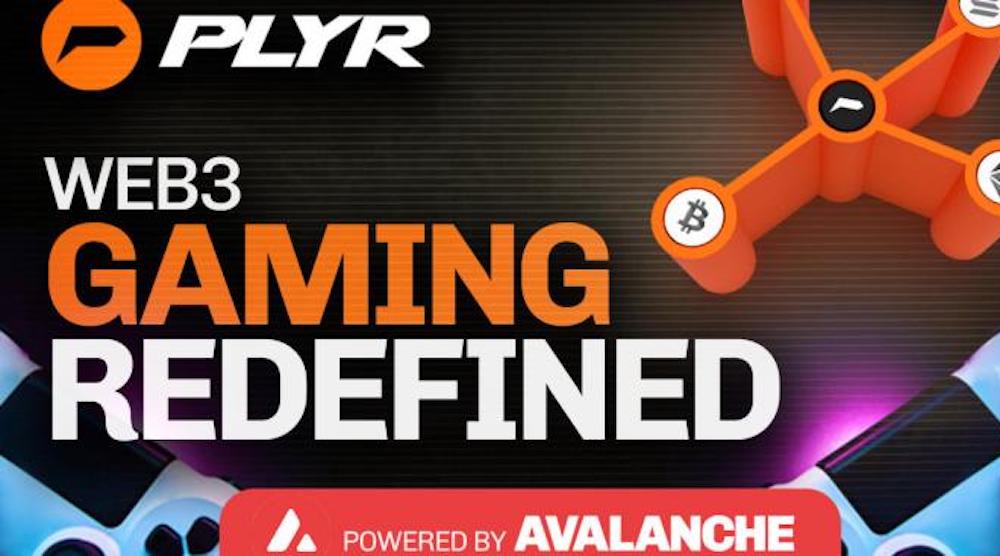
The PLYR Gaming Blockchain mainnet is set to launch as an Avalanche Subnet today on July 1st, 2024. This significant milestone marks the beginning of a new era in crypto gaming, aimed at creating a seamless and interconnected gaming universe that spans multiple blockchains.
What is PLYR Gaming Blockchain?
PLYR Gaming Blockchain is an advanced platform designed to revolutionize the gaming experience by leveraging blockchain technology. It focuses on creating a decentralized, secure, and transparent environment where players can truly own their in-game assets, enjoy thrilling play-to-earn opportunities, and engage in a dynamic gaming community.
Multichain Empowerment
PLYR Gaming Blockchain is designed to empower crypto gaming by connecting all chains. This multichain approach ensures that players from various blockchain communities can interact, trade assets, and participate in games without limitations. By bridging these chains, PLYR enhances interoperability and inclusivity within the crypto gaming ecosystem.
Key Features of PLYR Gaming Blockchain
1. Cluster Nodes: Cluster nodes are the cornerstone of the PLYR ecosystem, allowing users to participate in the network’s governance and earn rewards. By operating a cluster node, users contribute to the decentralization and security of the platform.
2. PLYR-ID: PLYR-ID is a unique decentralized identity solution that provides players with a unified identity across all games and platforms within the PLYR ecosystem. This feature ensures seamless access and a personalized gaming experience.
3. PLYR-AUTH: PLYR-AUTH provides secure and seamless authentication across all PLYR-enabled games and services. Additionally to PLYR-ID, the InstantPlayPass feature simplifies the login process and enhances security by leveraging decentralized authentication methods, ensuring a smooth and secure gaming experience for all users. This innovative feature allows players to quickly jump into games without lengthy sign-up processes.
4. PLYR-API: PLYR offers a comprehensive suite of tools for game developers, including SDKs and APIs, to integrate blockchain functionality into their games effortlessly. These tools simplify the development process and enable the creation of innovative, blockchain-powered games.
5. Sidekick App: The Sidekick app is designed to enhance the gaming experience by providing players with real-time mobile updates, notifications, and easy access to their assets and rewards. It acts as a companion app, keeping players engaged and informed.
6. Gamestake: Gamestake rewards players and active participants of the platform with $GAMR tokens. These tokens can be used to participate in games on the PLYR chain, creating a vibrant and rewarding ecosystem. By participating in Gamestake, players can maximize their engagement and enjoyment while earning valuable rewards. More details can be found on the Gamestake page.
7. Web3 Games Marketplace: The PLYR crypto games marketplace is a hub for discovering and purchasing games. It features a wide variety of games including both Web2 and Web3 games.
8. In-House Developed Games: PLYR has developed several exciting games, including:
- ZooRacers: A battle-kart game where players can engage in intense combat and compete for rewards.
- ZooNo: A card game based on Uno, with some added twists for a unique gaming experience.
- Poker ZooGenes Hold’Em: A unique poker game that integrates NFT-based characters and assets.
- Telegram Games: BangBang, ZooQuiAI, and Wild Kingdom, which connect to the blockchain for direct rewards distribution.
How to Get Started
- Website and PLYR-ID Creation: Users can visit the PLYR Network website to create a PLYR-ID, which provides access to the latest updates and features.
- Community Engagement: Staying informed about events and news is possible by following PLYR on social media platforms such as Twitter(X).
- Participation in Events: Engaging with the community and earning rewards is facilitated through participation in various events organized by the platform.
- Roadmap and Future Updates: The roadmap available on the PLYR website offers insights into future developments and milestones, helping users stay informed about upcoming enhancements.
Looking Ahead
The launch of the PLYR Gaming Blockchain mainnet is just the beginning. An ambitious roadmap is in place, with plans to introduce more games, expand the ecosystem, and continuously improve the platform based on community feedback. This initiative aims to revolutionize the gaming industry and create a thriving community of passionate gamers.
About PLYR
The PLYR Subnet is a dedicated blockchain network on the Avalanche platform, optimized for the gaming industry. It offers low-cost, fast, and secure transactions, enabling seamless in-game purchases, asset transfers, and reward distributions. With a strong focus on interoperability, the PLYR Subnet integrates with over 200 blockchain networks, providing a robust and scalable foundation for cross-chain gaming experiences and innovative decentralized applications. This specialized subnet empowers developers and gamers with efficient, high-performance solutions tailored to the needs of modern gaming.
The groundbreaking launch on July 1st, 2024, marks a significant milestone in the gaming industry. The PLYR Gaming Blockchain is set to become a major player in the future of gaming, building on the successes of platforms like Gala, Immutable, and Beam.
Blockchain
Taiko Celebrates One Month on Mainnet with Explosive Growth and Ambitious Plans

Taiko, a based rollup protocol designed to scale Ethereum natively, is proud to mark its one-month milestone on the mainnet with remarkable achievements and a bold vision for the future. Since its launch, Taiko has experienced exponential growth across various metrics, setting the stage for a promising journey ahead.
The mainnet statistics speak volumes about Taiko’s rapid ascent in the Ethereum Scaling L2 space. With a total value locked (TVL) of $138,730,000 and processing an average of 19.53 transactions per second daily, Taiko has swiftly emerged as a formidable player in the ecosystem. Noteworthy milestones include processing 45.3 transactions per second on June 27, reaching a total of 21,575,719 transactions and 108,443 blocks, and attracting 699,616 unique wallets to the network.
A key highlight of Taiko’s recent progress is the transition to permissionless block proposing and proving, making it the first Ethereum-based rollup to offer this feature. The network has seen active participation from 44 unique proposers and 32 unique provers, showcasing a vibrant and decentralized community eager to contribute to Taiko’s growth.
Taiko’s ecosystem has flourished with integrations from over 80 DeFi, gaming, bridge, and other projects. Popular games like Stupid Monkeys, Crack & Stack, and LooperLands have found a home on Taiko’s mainnet, signaling a burgeoning gaming ecosystem. The launch of the TAIKO token on June 5, followed by successful listings on major exchanges and decentralized platforms, has further fueled Taiko’s momentum.
In an innovative move, Taiko introduced the Trailblazers program, rewarding users and dapps with a staggering 12 million TAIKO tokens (10 million for users, 2 million for dapps) for active participation within the ecosystem this season. Nearly 600,000 users have already joined the program, minting over 220,000 Faction badges and engaging in exciting actions across various categories.
Looking ahead, Taiko remains committed to expanding its ecosystem, attracting new protocols, and increasing TVL. Technical advancements, including the upcoming launch of Raiko and continued development of the booster rollup scaling solution, promise to further enhance Taiko’s capabilities.
Blockchain
Chainlink Data Streams Is Live on Avalanche Mainnet With GMX V2
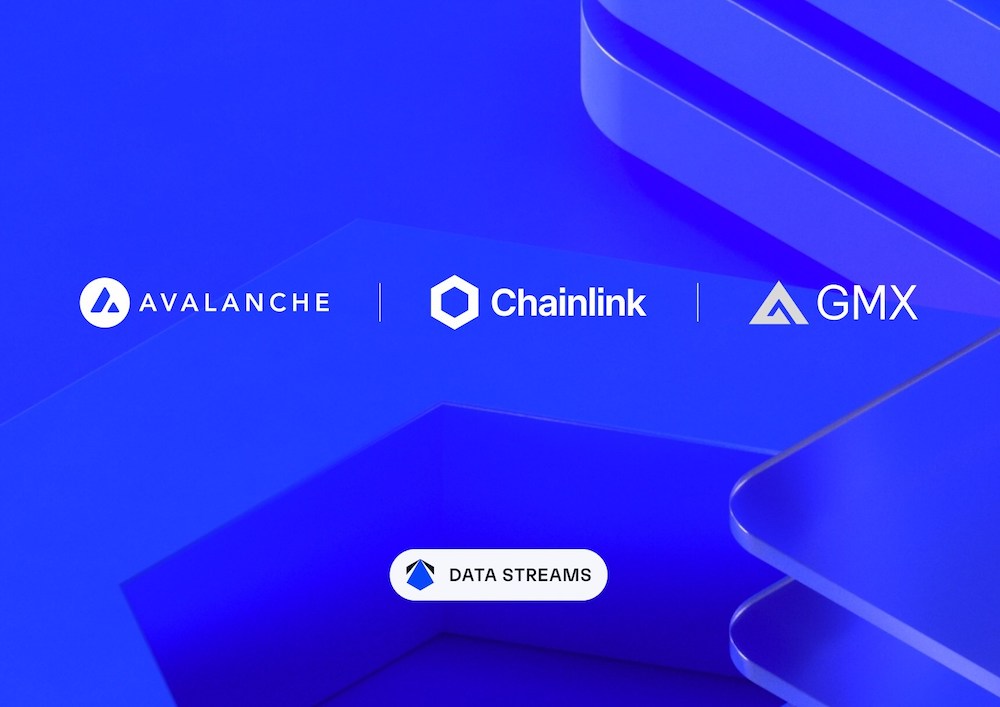
Chainlink, the industry-standard decentralized computing platform, Avalanche, a leading blockchain platform designed for speed, scalability, and security, and GMX, a leading onchain perpetual and spot exchange that offers deep, liquid markets for many top crypto assets, have today announced that Chainlink Data Streams has officially launched on Avalanche, with GMX as a launch partner using Data Streams to help power its decentralized perpetual exchange. Chainlink Data Streams unlocks a new generation of high-throughput DeFi markets on Avalanche.
Chainlink Data Streams is the all-in-one data solution for the DeFi market, combining low-latency market data and automated execution to unlock a new generation of ultra-fast and user-friendly high-throughput DeFi products. By supplying high-frequency market data using robust, decentralized infrastructure, Data Streams enables high-throughput DeFi products to create a seamless user experience comparable to CEXs while providing unprecedented onchain execution speed and battle-tested security infrastructure.
“We’re pleased to help power the next generation of high-throughput DeFi products on Avalanche through Chainlink Data Streams,” said Johann Eid, Chief Business Officer at Chainlink Labs. “By offering unmatched speed and resiliency, Data Streams enable DeFi protocols to provide ultra-fast, high-throughput DeFi products while maintaining the high-security guarantees of onchain finance.”
With Chainlink Data Streams, dApps have on-demand access to high-frequency market data backed by decentralized and time-tested Chainlink infrastructure. Chainlink Data Streams features a low-latency, pull-based oracle that provides a continuous stream of real-time market data, allowing dApps to pull information at any time.
“We’re excited to see Chainlink’s low-latency oracle solution on Avalanche,” said Lydia Chiu, Senior Vice President of Business Development at Ava Labs. “Chainlink Data Streams’ low-latency market data and automated execution enable Avalanche ecosystem projects to provide users with industry-leading performance facilitated by decentralized, credibly neutral Chainlink infrastructure.”
“GMX’s Data Streams integration on Avalanche mainnet is all about expanding the success of our GMX V2 launch,” said Coinflip, core contributor at GMX. “Chainlink Data Streams has meaningfully contributed to the decentralized exchange’s speed and resiliency, and we’re excited to bring those same benefits to all the traders and liquidity providers in the Avalanche community.”
About Chainlink
Chainlink is the industry-standard decentralized computing platform powering the verifiable web. Chainlink has enabled over $12 trillion in transaction value by providing financial institutions, startups, and developers worldwide with access to real-world data, offchain computation, and secure cross-chain interoperability across any blockchain. Chainlink powers verifiable applications and high-integrity markets for banking, DeFi, global trade, gaming, and other major sectors.
About Avalanche
Avalanche is a smart contracts platform that scales infinitely and regularly finalizes transactions in less than one second. Its novel consensus protocol, Subnet infrastructure, and HyperSDK toolkit enable Web3 developers to easily launch powerful, custom blockchain solutions. Build anything you want, any way you want, on the eco-friendly blockchain designed for Web3 devs.
About GMX
GMX is a leading onchain perpetual and spot exchange that offers deep, liquid markets for many top crypto assets. With its composable liquidity pools offering market-leading APRs and more than 100 DeFi integrations, GMX forms a foundational liquidity base layer for the Avalanche and Arbitrum blockchains.
Blockchain
SingularityNET and OriginTrail: Advancing Decentralized Knowledge Graphs
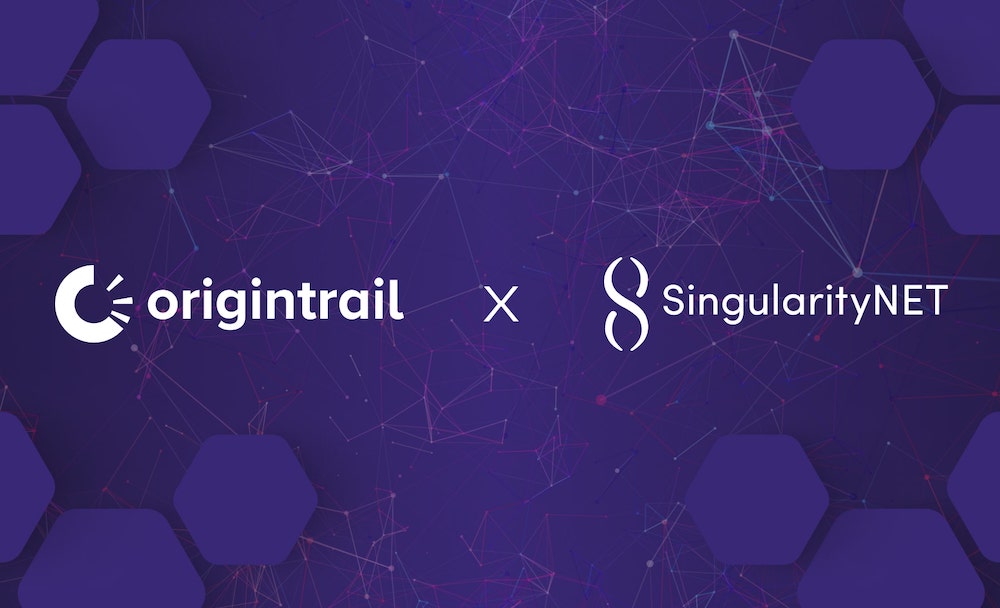
An innovative collaboration has emerged in the AI sector, as SingularityNET, a leading AI platform developer headquartered in Zug, Switzerland, and Trace Labs, the core development company of OriginTrail, based in Hong Kong, have just announced a strategic partnership aimed at supporting the development of the Knowledge Layer – the Internet of Knowledge.
This partnership signifies that two prominent players in the AI industry have come together to support a decentralized ecosystem where AI agents and infrastructure partners collaborate within the decentralized knowledge graph (DKG) landscape.
OriginTrail is an ecosystem dedicated to building a Verifiable Internet for AI, and this partnership marks the beginning of their collaboration with SingularityNET’s leading AI platform and robust ecosystem.
In some of the key highlights of this partnership, Trace Labs is tasked with developing sophisticated infrastructure that allows for efficient access and retrieval of information stored on the DKG, tackling challenges of AI hallucinations, bias, and model collapse due to an explosion in the amount of synthetic data produced by AI. This effort is aimed at enhancing the functionality and responsiveness of the decentralized knowledge graph within the OriginTrail network.
SingularityNET will then provide users access to its decentralized platform, where specialized AI models and Large Language Models (LLMs) can be purchased and used for data analysis. These models are designed to operate seamlessly with the data supported by the OriginTrail network, fostering a more robust ecosystem. The company will also develop AI models that can be trained directly on the Decentralized Knowledge Graph. This approach helps realize the shared vision of the two partners; eliminating the need for data centralization, and leveraging the decentralized nature of the blockchain to enhance privacy and security.
Leveraging SingularityNET’s leading position in mission-critical research of Artificial General Intelligence (AGI) and Trace Labs’ experience in commercializing Web3 and AI solutions, the strategic partnership is in particular aimed at solving the real world challenges with decentralized AI within the key sectors, such as Industry 4.0, decentralized science (DeSci), real world assets (RWA), and education.
Dr. Ben Goertzel, CEO of SingularityNET, stated, “As we move from an Internet of documents, media and apps to an internet of knowledge and AI, the basic composition of the Internet as a ‘decentralized network of decentralized networks’ becomes ever more important. Both SingularityNET and Trace Labs have powerful capability to grow decentralized networks around knowledge graphs and associated AI capabilities; connecting these networks together into a cross-linked, cross-token meta-network will yield a host of different synergies enabling a broad-based boost in intelligent functionality. As a practical example: Putting together a subgraph of OriginTrail’s DKG decentralized knowledge graph covering shipping logistics, with a knowledge meta-graph living in the OpenCog Hyperon system deployed on SingularityNET covering the timing of events in various markets, one could achieve an unprecedented level of emergent knowledge in the minds of AI agents carrying out supply-chain planning and forecasting. SingularityNET’s new MeTTa-Motto tool integrating Hyperon symbolic AI with LLMs and other deep neural nets could play a critical role here. Similar examples exist in every vertical market, which gives this partnership an almost unbounded potential for economic benefit and human good.”
Žiga Drev, Managing Director of Trace Labs, added, “The benefits of AI are limitless and so are the risks, like hallucinations and model collapse as the growth in synthetic data outpaces the provision of real world data. A truly open AI that fosters inclusion and a more equitable distribution of value can only be achieved through a collaborative and modular approach. We are proud to partner with SingularityNet, founded and led by the visionary Dr. Ben Goertzel, who coined the Artificial General Intelligence (AGI). Working alongside the leading visionaries at the convergence of crypto and AI opens exciting opportunities to accelerate real-world adoption of neuro-symbolic AI, combining the power of OriginTrail Decentralized Knowledge Graph (DKG) and SingularityNET’s specialized marketplace for Large Language Models (LLMs) and other AI models.”
Both organizations will also engage in collaborative marketing and social media efforts to promote their partnership and the innovations it brings to the blockchain world, the AI industry, and the intersection of these two sectors. The two partners are also mutually exploring and plan to integrate AI services into Trace Labs’ DKG and paranets.
The partnership is about working together today to solve the challenges of tomorrow; synergizing blockchains and knowledge graphs for safe, verifiable AI that emphasizes secure and privacy-preserving mechanisms for user authentication and authorization within the knowledge layer, and ultimately ensuring all data processing by users is rooted in their consent.
About SingularityNET
SingularityNET was founded by Dr. Ben Goertzel with the mission of creating a decentralized, democratic, inclusive and beneficial Artificial General Intelligence (AGI). An AGI is not dependent on any central entity, is open to anyone and is not restricted to the narrow goals of a single corporation or even a single country. The SingularityNET team includes seasoned engineers, scientists, researchers, entrepreneurs, and marketers. Our core platform and AI teams are further complemented by specialized teams devoted to application areas such as finance, robotics, biomedical AI, media, arts and entertainment.
About OriginTrail
OriginTrail is an ecosystem building a Verifiable Internet for AI, providing an inclusive framework that tackles the world’s challenges in the AI era, such as hallucinations, bias, and model collapse, by ensuring the provenance and verifiability of data used by AI systems. OriginTrail is used by global leaders like the British Standards Institution, Swiss Federal Railways, Supplier Compliance Audit Network (SCAN), representing over 40% of US imports and several consortia funded by the European Union among others. Advised by Turing award winner Dr. Bob Metcalfe, renowned for his law of network effects, the Trace Labs team (OriginTrail core developers) plays a crucial role in promoting a more inclusive, transparent, and decentralized AI.
-

 Blockchain3 weeks ago
Blockchain3 weeks agoHinkal announces ‘EigenLayer for Privacy’ with the upcoming launch of the Shared Privacy Protocol
-

 News3 weeks ago
News3 weeks agoCwallet Expands Crypto Loans Landscape | Marking a New Era of Success in Lending
-
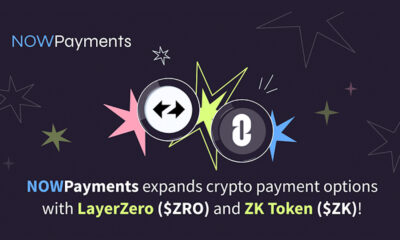
 Altcoins2 weeks ago
Altcoins2 weeks agoNOWPayments expands crypto payment options with LayerZero ($ZRO) and ZK Token ($ZK)
-

 Technologies2 weeks ago
Technologies2 weeks agoDiscover the Future of Trading with AXL Finance
-

 News2 weeks ago
News2 weeks agoAibit Launch Garners Industry Attention, Poised to Become a Rising Star
-

 Altcoins2 weeks ago
Altcoins2 weeks agoThe Covalent Network Successfully Migrates to New CXT Token to Drive Deeper Innovation in AI Following Governance Vote
-
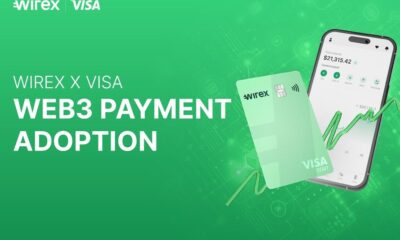
 Business2 weeks ago
Business2 weeks agoWirex and Visa Expand Partnership to Drive Web3 Payment Adoption
-

 Blockchain1 week ago
Blockchain1 week agoData Ownership Protocol – Itheum – Launches on Solana, Embracing AI and Gaming










You must be logged in to post a comment Login